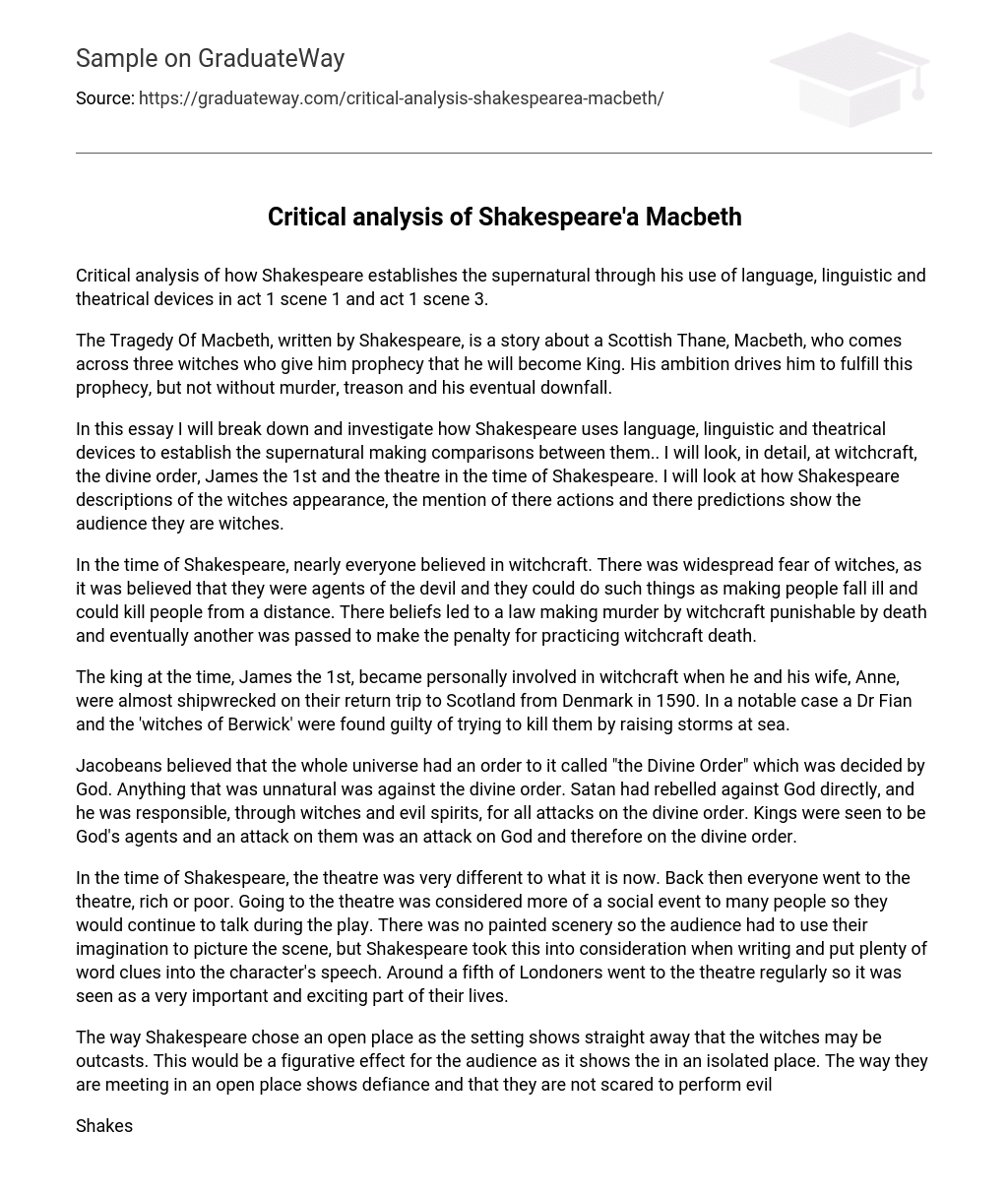Critical analysis of how Shakespeare establishes the supernatural through his use of language, linguistic and theatrical devices in act 1 scene 1 and act 1 scene 3.
The Tragedy Of Macbeth, written by Shakespeare, is a story about a Scottish Thane, Macbeth, who comes across three witches who give him prophecy that he will become King. His ambition drives him to fulfill this prophecy, but not without murder, treason and his eventual downfall.
In this essay I will break down and investigate how Shakespeare uses language, linguistic and theatrical devices to establish the supernatural making comparisons between them.. I will look, in detail, at witchcraft, the divine order, James the 1st and the theatre in the time of Shakespeare. I will look at how Shakespeare descriptions of the witches appearance, the mention of there actions and there predictions show the audience they are witches.
In the time of Shakespeare, nearly everyone believed in witchcraft. There was widespread fear of witches, as it was believed that they were agents of the devil and they could do such things as making people fall ill and could kill people from a distance. There beliefs led to a law making murder by witchcraft punishable by death and eventually another was passed to make the penalty for practicing witchcraft death.
The king at the time, James the 1st, became personally involved in witchcraft when he and his wife, Anne, were almost shipwrecked on their return trip to Scotland from Denmark in 1590. In a notable case a Dr Fian and the ‘witches of Berwick’ were found guilty of trying to kill them by raising storms at sea.
Jacobeans believed that the whole universe had an order to it called “the Divine Order” which was decided by God. Anything that was unnatural was against the divine order. Satan had rebelled against God directly, and he was responsible, through witches and evil spirits, for all attacks on the divine order. Kings were seen to be God’s agents and an attack on them was an attack on God and therefore on the divine order.
In the time of Shakespeare, the theatre was very different to what it is now. Back then everyone went to the theatre, rich or poor. Going to the theatre was considered more of a social event to many people so they would continue to talk during the play. There was no painted scenery so the audience had to use their imagination to picture the scene, but Shakespeare took this into consideration when writing and put plenty of word clues into the character’s speech. Around a fifth of Londoners went to the theatre regularly so it was seen as a very important and exciting part of their lives.
The way Shakespeare chose an open place as the setting shows straight away that the witches may be outcasts. This would be a figurative effect for the audience as it shows the in an isolated place. The way they are meeting in an open place shows defiance and that they are not scared to perform evil
Shakespeare uses linguistic devices such as repetition and metaphors to influence the supernatural on the audience. The repetition of the word thrice in the extract Thrice to thine/And thrice to mine, / And thrice again to make up nine. This gives a sinister and menacing sound as it sounds like a spell. This aural effect will also emphasize the word thrice. This may scare the audience as it was believed that three an its multiples were magic numbers.
Shakespeare uses rhyming couplets such as ” When shall we three meet again,/ in thunder lightning or in rain.” This makes it sound like they are casting an enchantment. This phrase also reinforces the fact that they can control the weather, as they are choosing what the weather will be like for the next time they meet. The fact that they rhyme suggests telepathy as it sounds like they knew what they were going to say. The order in which the witches speak suggests hierarchy in the group of witches.
Shakespeare uses alliteration in the phrase ‘ fair is foul and foul is fair’. The letter ‘f’ is a harsh sounding letter, and this will sound menacing towards the audience. The letter ‘f’ may get stuck in their head and scare them. This is a powerful aural effect and emotive towards the audience as it frightens them.
The way Shakespeare uses the tetrameter is appaudable as it makes the witches stand out. The witches speak in trochaic tetrameter were there are four feet of two syllables, with the stress on the first syllable of each pair, but frequently Shakespeare leaves out the last syllable of the last foot. The rest of the characters speak in iambic pentameter which has 5 feet and the stress is on the 2nd syllable. The speed that they say it at suggests telepathy as it sounds like they knew what they were going to say. The short lines of the trochaic tetrameter creates also makes it stand out.
The other characters reactions create a tension between the audiences as Banquo says ‘can the devil speak true?’ and ‘instruments of darkness’. This shows that Banquo is perceptive and realizes that the witches are linked to Satan while, in contrast, Macbeth is getting sucked in and believes everything that they say.
To conclude, Shakespeare establishes the supernatural very well through his powerful use of theatrical devices such as the thunder and lightning. He uses exciting linguistic devices such as the tetrameter which make the witches stand out, rhyming couplets which suggest telepathy and paradoxes which make them seem supernatural by confusing the audience. He uses good language to make them seem not human and this scares the audience.
Macbeth is a very well written play and is still enjoyed in modern day as it persuades you that if you commit a crime then you will eventually get punished.





